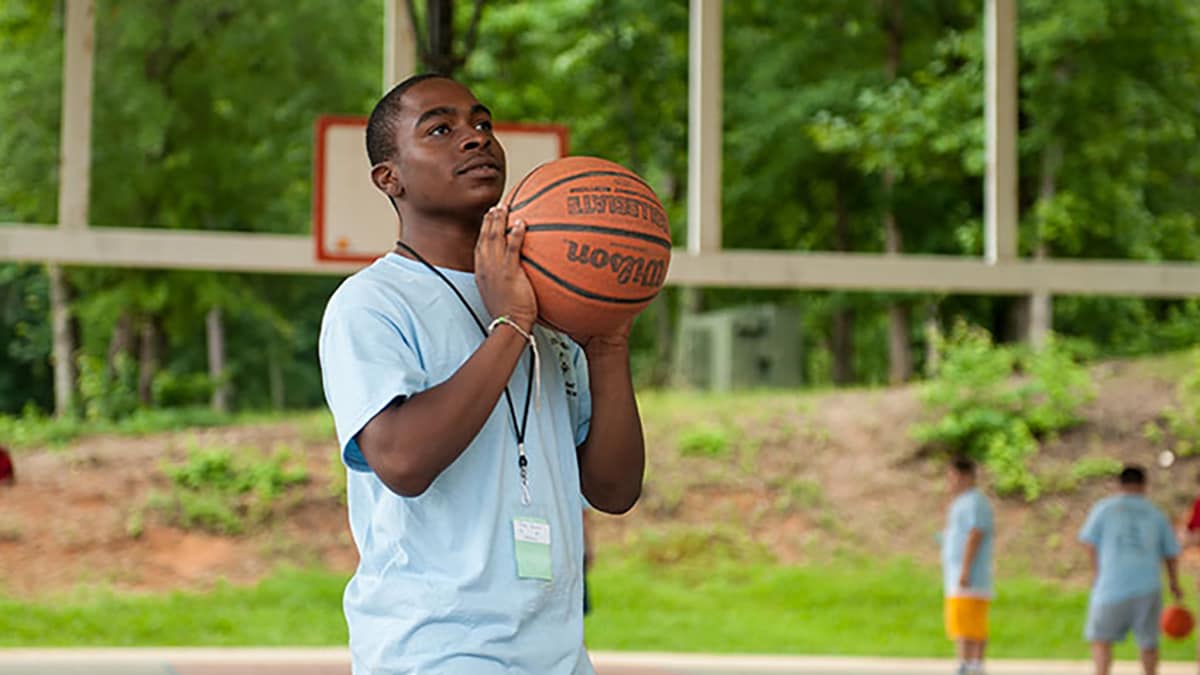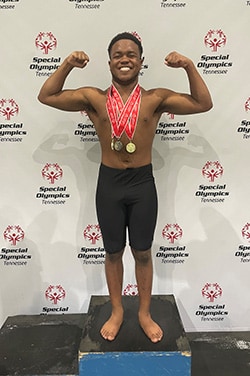About
- Centers for Disease Control and Prevention (CDC) works with Special Olympics to increase participation in programs among people with intellectual disabilities.
- Physical activity plays an important role in maintaining health, well-being, and quality of life.
- The Special Olympics partnership with CDC supports a range of health initiatives.
Physical activity for adults with intellectual disabilities
Physical activity is the cornerstone of good health. However, less than half of U.S. adults with disabilities meet the recommended physical activity guidelines.1
Learn how the Centers for Disease Control and Prevention (CDC) is working with Special Olympics to increase participation in year-round wellness programs among people with intellectual disabilities—a term used when a person has certain difficulties with thinking, learning, remembering, and reasoning.

May is National Physical Fitness and Sports Month. Physical activity plays an important role in maintaining health, well-being, and quality of life. According to the Physical Activity Guidelines for Americans, 2nd edition, physical activity can help control weight and lower the risk for early death, heart disease, type 2 diabetes, and some cancers. Physical activity can also improve mental health by reducing depression and anxiety. For people with disabilities, physical activity can help support daily living activities and independence.
Any amount of physical activity that gets your heart beating faster can improve your health. It helps to remember some activity is better than none. For even greater health benefits, the Guidelines recommend that all adults, with or without disabilities, get at least 150 minutes of aerobic physical activity per week, which can be broken down into smaller amounts each day. Muscle-strengthening activities, such as adapted yoga or working with resistance bands, provide additional health benefits and are recommend two days a week.
CDC and Special Olympics partnership
Fitness plays a key role in the mission of the Special Olympics—a CDC partner organization that provides year-round sports training and athletic competition in a variety of Olympic-type sports for children and adults with intellectual disabilities, giving them continuing opportunities to develop physical fitness, demonstrate courage, experience joy, and participate in a sharing of gifts, skills, and friendship with their families, other Special Olympics athletes, and the community. Physical activity, good nutrition, and hydration enhance athletes' sports performance and improve their overall health and quality of life. Recent Special Olympics data reveal that fitness programming is urgent, given that more than half of Special Olympics athletes are overweight, almost a third have obesity, and 57% have hypertension.2
CDC and Special Olympics have joined forces to increase the number of people with intellectual disabilities who participate in year-round wellness programming that includes flexible fitness intervention models and resources to promote weight loss and decrease blood pressure. Special Olympics also trains coaches and fitness instructors to work with people with intellectual disabilities and develops partnerships to support local and national fitness participation.
Inclusive health
To prevent illness and promote healthy behaviors and safety for people with disabilities, CDC is committed to disability inclusion in public health programs, working to eliminate barriers to health care and improve the ability to get routine preventive services. As part of this work, CDC supports Special Olympics' efforts to improve the physical and social-emotional well-being of people with intellectual disabilities by increasing inclusion in health care, wellness, and health systems for Special Olympics athletes and others with intellectual disabilities.
More broadly, the Special Olympics partnership with CDC supports a range of health initiatives, including
- The Healthy Athletes program, which facilitates health screenings, health promotion, and education; an expansion of access to follow-up care and wellness programming.
- Partnerships with medical schools and health professionals to integrate appropriate training and education for the next generation of health professionals.
- Development of the largest data set on people with intellectual disabilities in the country—to better analyze the problem of health inequality and how best to address it.
This partnership leverages the Special Olympics community of more than 700,000 athletes with intellectual disabilities, 135,000 coaches, and 700,000 volunteers to spark nationwide change.
Special Olympics athletes lead the way toward inclusive fitness
Meet Eric Massey: a two-time 2022 Special Olympics USA Games bronze medalist who is devoted to promoting a fit way of life for all. Eric is from Memphis, Tennessee, and currently studies exercise and movement science at the University of Memphis.

Eric's success as a Special Olympics athlete has been a result of training and determination, and he decided to include fellow athletes on his way there—2,000 of them! Leading up to the 2022 Games, he led weekly training videos for his peers and challenged them to join him in a fitness challenge. Eric doubled his weekly step goal and finished the challenge with nearly 2 million steps. Together, the participants took more than 2 billion steps.
"I'm proud of being a challenge leader and making videos each week to help my team members keep moving and learn ways to stay healthy," Eric said.
Eric also leads his own online fitness club to promote inclusive fitness and healthy behaviors. Through this channel, he leads stretching and yoga workouts and shares health tips. His mother, Dr. LaShaunda Massey, clinical director with Special Olympics Strong Minds, also joins and provides emotional wellness tips. Special Olympics fitness resources, such as Strong Minds and School of Strength, have been an inspiration to Eric.
Healthy behaviors, such as those shown by Eric, his mom, and others, can be taught and reinforced online and at school, at home, and in community settings. This is especially important for individuals with intellectual and developmental disabilities who often face barriers that limit access to community fitness opportunities and can lead to poor health outcomes.
Eric is among the growing number of people with intellectual disabilities who are leading the way when it comes to addressing and seeking to eliminate these barriers.
- Kayla Cornell of Michigan returned to school to focus on the importance of nutrition. She said, "One of the biggest struggles Special Olympics athletes have is in the area of nutrition, so I made it my passion and dedication to teach people with intellectual disabilities how to cook healthier foods. I started a cooking class for athletes called 'Let's Get Healthy Together.'"
- Daniel Fundora of Florida and James Kropp of Colorado have joined the ranks of certified personal trainers as they promote inclusive fitness opportunities.
In 2022, more than 70,000 athletes with intellectual disabilities participated in Special Olympics fitness programming, in big part thanks to the partnership for inclusive health between Special Olympics and CDC.
- Centers for Disease Control and Prevention, National Center on Birth Defects and Developmental Disabilities, Division of Human Development and Disability. Disability and Health Data System (DHDS) Data [online]. [accessed May 4, 2021]. URL: https://dhds.cdc.gov
- Special Olympics International. Healthy Athletes data (2007-2020). Washington, DC.
